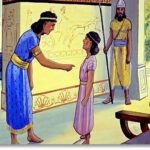A Powerful Witness
Always be prepared to give an answer to everyone who asks you to give the reason for the hope that you have. 1 Peter 3:15
Her story is told in three verses, yet the legacy of her faith has endured for almost 3,000 years. She was simply a “young girl” taken captive by the Aramean army. Given to the army commander, Naaman, as a prize of war, the enslaved Israelite girl served his wife (2 Kings 5:2–4).

This young girl glorified God by serving Naaman and his wife in a way that pleased God. As Colossians 3:22 says, she served “with sincerity of heart and reverence for the Lord.” When the opportunity arose, she testified of God’s greatness by suggesting that Naaman seek healing in Israel: “If only my master would see the prophet [Elisha] who is in Samaria! He would cure him of his leprosy” (2 Kings 5:3). She depended on God’ merciful character, believing he would heal the commander even though he wasn’t an Israelite.
The young girl spoke of God. Elisha spoke for God. When Naaman arrived in Israel and asked for healing, the prophet sent him a message: “Wash yourself seven times in the Jordan … and you will be cleansed” (2 Kings 5:10). At first, Naaman was reluctant to do what Elisha said, but the Aramean’s servants convinced him to obey, and Naaman was healed (2 Kings 5:14).
Consider the ultimate result of the girl’s witness and Elisha’s: After Naaman’s leprosy had been cured, he said, “Now I know that there is no God in all the world except in Israel” (2 Kings 5:15).
We may not speak for God as Elisha did, but we can all speak about God to anyone who crosses our path. Like this young girl, we may be only one part of the chain that leads someone to faith in God. She directed Naaman to Elisha, who delivered God’s word to the Aramean commander. And who knows how many Armeans trusted in the true God because of Naaman’s testimony?
What a privilege to influence someone else’s life as significantly as this young girl and Elisha influenced Naaman’s. In Luke 12:12, Jesus promises that “the Holy Spirit will teach [us] … what [we] should say” when the time is right. With whom can you share a story of God’s greatness?
Dig Deeper
Read 2 Kings 5:1–14. In what ways do Naaman’s other servants demonstrate their belief in God? What information given about Naaman in the passage indicates why his servants were so concerned about his welfare?
Read 2 Kings 5:4–7 and 15–27. How do the king of Israel and Gehazi, Elisha’s servant, show that they are unworthy witnesses of God’s greatness?
What counsel does Peter give in 1 Peter 3:13–17 about when, where, and why we should speak about our faith?
Denise K. Loock
This devotion is part of our series on Elijah and Elisha.
